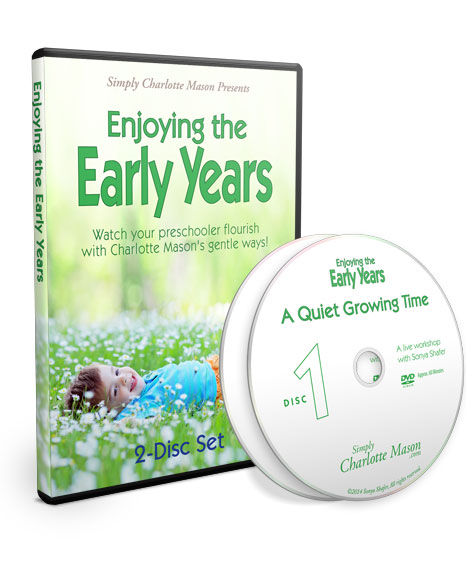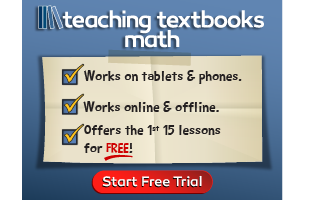When we talk about Charlotte Mason education, we think of narration, nature walks, dictation, and reading real books. That's great for children in the elementary years, but what about preschoolers? In Enjoying the Early Years, a video workshop that runs about 100 minutes in all, Sonya Shafer shares both Charlotte Mason's general ideas about laying an educational foundation for preschoolers and practical ways to teach beginning math and reading skills. The workshop can be purchased as a digital download or on two DVDs.
At the beginning, Shafer talks about the importance of providing the best learning atmosphere for your child—an atmosphere of good books, great art, and wonderful music rather than one focused on academics. She stresses the importance of developing good habits in the early years, habits that will apply to life in general as well as to education. These areas should be your first priority. Children need to develop habits such as attentiveness and obedience for you to be able to teach them effectively. But at the same time, we should introduce our children to the wonders of nature that God has created outdoors and in living creatures as well as to the beauty of art and music. We also want to open the world of imagination to our children with good books while helping them develop an eagerness to learn to read so that they can investigate the world of books on their own.
Parents still want to know how to actually teach early math and reading skills, so on the second disc, Shafer explains Mason's ideas for introducing math and reading skills. There are striking similarities to Ruth Beechick's ideas (see The Three R's) in what Shafer presents which shouldn't be surprising since both Mason and Beechick had similar views of how children learn through the elementary grades. Shafer suggests that for math the best learning takes place through everyday activities such as counting the place setting at the table, practicing one-to-one correspondence as you identify one place setting for each member of the family, and adding or subtracting for guests or missing family members. Beginning reading skills are likewise introduced in a gentle, relatively unstructured manner. She suggests introducing one letter at a time with a movable alphabet (e.g., magnetic, plastic, wooden, or foam letters). Learning the sounds and names of letters should be a relaxed, game-like activity rather than a formal lesson. You gradually start forming sounds into words in a similar fashion, teaching basic phonetic generalizations rather than rules to memorize. You teach phonics, but not an intensive phonics approach that is rules-oriented.
Shafer has a few of her favorite resources (e.g., books and movable letters) on hand that she shows the audience so they will have a clear understanding and a visual memory of what she is saying.
The seminar was recorded from a live presentation, so there are occasional questions from the audience. It appears that at least two cameras were used so the angle and view changes from time to time to make the presentation more interesting to watch.
Shafer's presentation is a refreshing and encouraging contrast to the intensively academic preschool programs that are becoming more and more common. I totally agree with this approach and find that children readily learn their basic skills when they are taught in relaxed, informal settings as Shafer recommends.








